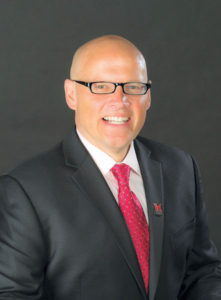
Work+ offers real world work experience and a decent wage
By David Holthaus
A new program starting in Ohio this school year will deliver the trifecta for some fortunate college students: real-world work experience, a decent wage and the cost of tuition covered.
It’s called Work+ and four employers are participating in its inaugural years along with the Hamilton and Middletown Regional Campuses of Miami University.

Students who participate in the program will work part time, typically 20-25 hours a week, with one of the participating companies while taking classes at one of the Miami regional campuses. The students can pursue any major. In return, Work+ participants will receive a wage and tuition.
“We want to offer the ability for students to graduate debt free,” says Natasha Williams, lead talent acquisition manager for Deceuninck North America, one of the participating employers.

Williams says Deceuninck will host 10 to 15 freshman students in the program this year at its plant in Monroe, Ohio.
Deceuninck makes PVC window and door frames and employs about 550 people in that location.
“In exchange for us paying their tuition at Miami Hamilton or Miami Middletown, we will expect them to work 24 hours for us in the plant,” she says.
The agreement is on a year-to-year basis and students need to maintain a C average and satisfactorily complete their work assignments.
“We’d love to have them here for all four years,” Williams says.

Work+ was the brainchild of Ohio Senator William P. Coley, II (Senate District 4), who announced it in May with Rob Brundrett, director, public policy services, of the Ohio Manufacturers’ Association, and Miami University President Gregory Crawford.
“It’s our goal that these students will graduate with degrees and graduate with no debt,” Coley says.
The other participating companies are Thyssenkrupp Bilstein in Hamilton, The Fischer Group in Fairfield and the West Chester-based Butler County Regional Transit Authority. Thyssenkrupp Bilstein manufactures automotive suspension products, Fischer Group is a manufacturing and product development company and the Butler County Regional Transit Authority operates buses and other transportation options.
Miami students in the Deceuninck plant probably work in the extrusion or lamination areas, Williams says, and will be cross-trained to work in other areas. The students could eventually earn up to $16 an hour if they stay until their senior years, she explains.
The company introduced the program’s first year by sending postcards to employees, advertising through internal channels, and through its social media networks. In the fall, the company plans to get the word out to high schools in the area, Williams says. The students hired so far at Deceuninck include three psychology majors, a biology major and a computer science major.
Williams says the company will hire students up to their junior year, but prefers students who are at an earlier stage in their college career, so they can be trained and possibly return.
“It’s about giving back to the community, number one. Number two, we also get workers,” she says. “It’s hard to find good quality workers in manufacturing.”
In Ohio and across the country, there’s a widening gap between the manufacturing jobs that need to be filled and the skilled talent pool capable of filling them. A 2018 study by Deloitte (a financial, consulting and risk management company) and the Manufacturing Institute revealed that the skills gap may leave an estimated 2.4 million positions unfilled over the next 10 years, with a potential economic impact of $2.5 trillion. The study also found positions relating to digital talent, skilled production and operational managers may be three times as difficult to fill in the next three years.
“There are multiple advantages to this program,” says Cathy Bishop-Clark, associate provost and dean of Miami University’s regional campuses. “Employers get more consistency in their entry-level workforce. Participants learn both technical and soft skills, and they can potentially create a pathway to a career if they perform well.”
The program also addresses the persistent issue of college affordability and student loan debt. National figures show that the costs to students and their parents associated with higher education have increased substantially over the last 35 years, rising several times higher than the general rate of inflation over the same period of time.
The substantial rise in higher education tuition has led to a similar rise in student loan debt. In 2013, outstanding student loan debt nationally was well over $1 trillion, surpassing—for the first time ever—the amount of outstanding credit card debt.
And although Ohio’s four-year institutions in recent years have limited in-state tuition increases, Ohio’s universities have the 12th-highest average cost of in-state tuition and mandatory fees, according to the state’s Department of Higher Education. And the state’s community colleges have the 16th-highest prices, the department says.
Crawford, Miami University’s president, hopes other universities and businesses will watch how the Work+ program succeeds and join it, bringing its benefits to more students and employers.
“I think it’s going to be a model template that can propagate throughout Ohio and deliver a great workforce that Ohio needs right now,” he says.

In-state tuition and fees at Miami’s regional campuses amount to $3,143 for students entering school in the fall of 2019.
The program is an extension of Deceuninck’s tuition reimbursement program, says Amy Padgett, the company’s North America vice president of human resources.
“We see this as a unique opportunity to not only grow and develop our workforce but also give back in our community in a measurable way,” she says. “Work+ will give even more students an exciting career path. They gain hands-on experience in a large manufacturing organization while earning a wage and getting their tuition paid. It’s a win-win.”
She says students will benefit by having increased awareness of job requirements and career opportunities, while local companies will have greater access to more skilled workers.
Crawford says the Work+ program has been in development for about a year.



